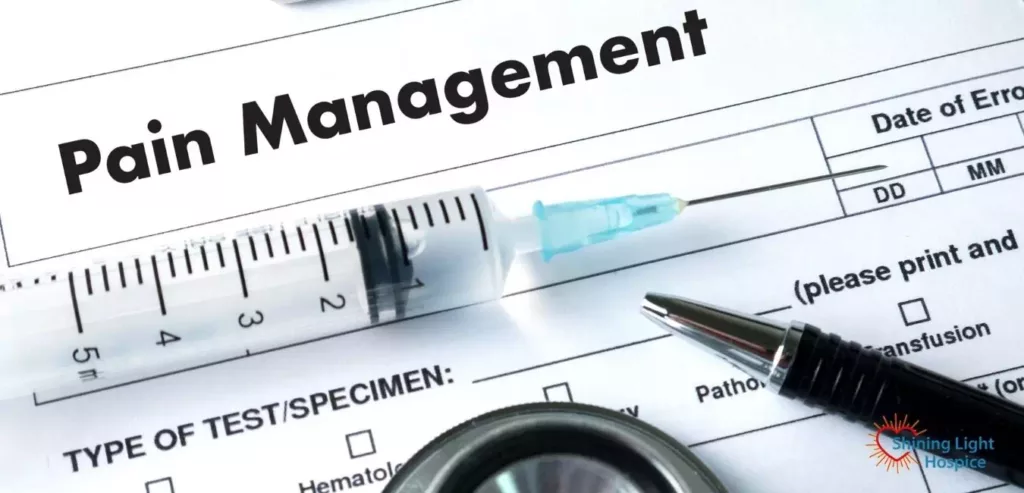Pain Management Tailored to the Individual

Too often, aging goes hand in hand with chronic health conditions that leave patients in pain. No one should be forced to endure pain without help. Our hospice physician services are customized to each individual’s situation and designed to manage a patient’s symptoms through collaboration with their primary doctor. These services are particularly critical for patients struggling with cancer and chronic diseases.
We carefully designed our team of hospice and palliative care doctors. The goal was to create a team with extensive knowledge and understanding of pain management techniques, including pharmaceuticals, to help our patients minimize discomfort and improve their well-being and quality of life, while simultaneously reducing their suffering. We focus on managing each patient’s symptoms to improve quality of life, reduce pain and discomfort, and ensure dignity and care.
Our doctors help each patient minimize pain with as few medications and the lowest dosages possible. They also work to monitor patient reactions to medications to identify the ideal dosage amount for each condition and each patient. This way, they can mitigate pain without causing additional adverse effects.

Shining Light Hospice patients often report almost all of their pain has been alleviated. This allows them to improve their lives and enjoy their remaining time – they can sleep and eat, interact with family and friends, and be confident and aware at all times. We deliver safety, security, and comfort during the most trying times of a patient’s life.
However, our holistic approach helps ensure the right treatment method at the right time. For instance, oxygen and breathing treatments are administered to patients experiencing shortness of breath. Patients experiencing nausea are given effective nausea medication. Our goal is to always ensure patients in our care enjoy a high quality of life, while remaining emotionally aware, alert, and retaining their sense of freedom and confidence.
Patients in need of pharmaceutical pain management may be prescribed opiates or opioids, which can be administered either by mouth or intravenously. Examples include morphine, as well as codeine, hydrocodone, oxycodone, and hydromorphone, all of which are effective and long-lasting when used properly.
Contact us today to learn more about hospice physician services.
Important Information for Patients and Family Members

As part of our hospice physician services, a patient may be prescribed morphine to help control pain. Opioids can cause several side effects, and understanding them is important to ensure the quality of care. If a patient experiences pain, and opioids are necessary, we prescribe gentle treatment options to help avoid these side effects.
Sedation and Lethargy:
One of the most common side effects of morphine is sedation and a feeling of lethargy, or drowsiness and loss of energy. In most cases, these symptoms dissipate as the patient acclimates to the medication. For most patients, the pain relief allows them to get the rest they were denied previously. Once they are fully rested, they become awake and aware, and more interested in daily activities.
Nausea:
Opioids like morphine may cause nausea, at least initially. For many patients, the effect wears off within just a few days of beginning their pain management regimen. Our physician can offer several medications to help deal with nausea until it goes away on its own.
Constipation:
Constipation is a very common side effect of morphine pain management, as well as other opioids. We recommend that patients manage constipation to reduce discomfort and maintain health. Our physician will also monitor the patient’s bowel health continuously.
Addiction:

Opioids are addictive, but for most hospice patients, the brief duration of use is too short to cause much concern. However, patient and family member concerns are natural. Note that removing a patient from morphine (or another opioid medication) should be done gradually, over two weeks, as the body will have acclimated to the medication and quitting immediately could cause adverse reactions (this is not addiction, simply acclimation). While our team of medical professionals will always follow a patient’s wishes, they will also always work to minimize pain as much as possible.
Loss of Effectiveness:

Managing pain and discomfort with morphine over a long period will naturally create a loss of effectiveness. However, most patients see an increase in symptoms due to the evolution of their disease. This results in increased pain over time. Our physician can increase the medication dosage to keep pace with both increased pain and increased medication tolerance. In some cases, it may be necessary to change medications to find the most effective option.
